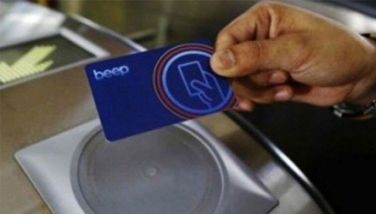Sy’s SM Group to pursue Equitable PCI Bank buy-in
April 23, 2004 | 12:00am
Despite strong opposition from the Go family, the SM Group of retail magnate Henry Sy remains interested in buying into Equitable PCI Bank, the third biggest bank in the country in terms of assets.
Sy’s daughter Teresita Sy-Coson told reporters that the group’s efforts to get into Equitable PCI Bank is "separate" from its negotiations with the Social Security System with respect to the acquisition of the latter’s shareholdings in the bank.
Banco de Oro (BDO) Universal Bank controlled by the SM Group, signed last January a deal to buy the 29 percent stake held by the SSS. The deal, if it pushes through, will make SM Group the single biggest stockholder in Equitable PCI Bank and entitle them to four board seats in the 15-man board.
Coson said they expect the deal with the SSS to be closed by end-June this year. "We are sticking to the timetable. Closing of the deal is expected six months from the signing of the agreement," she said.
The deal, though, is still subject to clearance from the Department of Justice.
The Sy group tried but failed to win a board seat in Equitable PCI Bank during the bank’s stockholders’ meeting Tuesday. Its nominees to the board were rejected by the Equitable PCI Bank management, citing conflict of interest. The group of Go has a 24 percent stake in Equitable PCIbank.
Equitable PCI Bank argued that its by-laws and a precedent set by the Supreme Court allowed it to protect itself by preventing competitors from getting into its board.
A Supreme Court ruling in the 1980s had barred businessman John Gokongwei from entering the board of beverage and food conglomerate San Miguel Corp. because he had a competing food company, Universal Robina Corp.
The same court ruling was cited by telecommunications giant Philippine Long Distance Telephone Co. when Gokongwei also tried to buy out PLDT in 2002. Gokongwei controls PLDT rival Digital Telecommunications Philippines Inc.
The four nominees submitted to Equitable PCIBank’s nomination committee were former TA Bank president Exequiel Villacorta, bankers Violeta Lim and Josefina Tan, and former Interior and Local Government secretary Rafael Alunan III.
The Sy group, however, said Philippine banking laws allow cross-ownership among banks.
SSS earlier said BDO’s proposal to purchase its entire stake in Equitable PCI Bank offers the institution a rare opportunity to recover and realize a return from a low-performing investment.
The SSS, which now seeks to be paid in outright cash, aims to generate a higher price of P16 billion from the sellout deal.
It will place the proceeds in a special series Treasury bond which could generate P16 billion over a six-and-a-half-year period, higher than the original expected proceeds of P14 billion.
According to De la Paz, BDO’s offer would allow the SSS to recover its acquisition costs for the shares and use the money to generate earnings that would benefit the institution and its 25 million members.
She said SSS has not received any dividends from the shares since four years ago and the deal offered an opportunity for SSS to improve its investment portfolio, which could lead to better viability for the fund.
Sy’s daughter Teresita Sy-Coson told reporters that the group’s efforts to get into Equitable PCI Bank is "separate" from its negotiations with the Social Security System with respect to the acquisition of the latter’s shareholdings in the bank.
Banco de Oro (BDO) Universal Bank controlled by the SM Group, signed last January a deal to buy the 29 percent stake held by the SSS. The deal, if it pushes through, will make SM Group the single biggest stockholder in Equitable PCI Bank and entitle them to four board seats in the 15-man board.
Coson said they expect the deal with the SSS to be closed by end-June this year. "We are sticking to the timetable. Closing of the deal is expected six months from the signing of the agreement," she said.
The deal, though, is still subject to clearance from the Department of Justice.
The Sy group tried but failed to win a board seat in Equitable PCI Bank during the bank’s stockholders’ meeting Tuesday. Its nominees to the board were rejected by the Equitable PCI Bank management, citing conflict of interest. The group of Go has a 24 percent stake in Equitable PCIbank.
Equitable PCI Bank argued that its by-laws and a precedent set by the Supreme Court allowed it to protect itself by preventing competitors from getting into its board.
A Supreme Court ruling in the 1980s had barred businessman John Gokongwei from entering the board of beverage and food conglomerate San Miguel Corp. because he had a competing food company, Universal Robina Corp.
The same court ruling was cited by telecommunications giant Philippine Long Distance Telephone Co. when Gokongwei also tried to buy out PLDT in 2002. Gokongwei controls PLDT rival Digital Telecommunications Philippines Inc.
The four nominees submitted to Equitable PCIBank’s nomination committee were former TA Bank president Exequiel Villacorta, bankers Violeta Lim and Josefina Tan, and former Interior and Local Government secretary Rafael Alunan III.
The Sy group, however, said Philippine banking laws allow cross-ownership among banks.
SSS earlier said BDO’s proposal to purchase its entire stake in Equitable PCI Bank offers the institution a rare opportunity to recover and realize a return from a low-performing investment.
The SSS, which now seeks to be paid in outright cash, aims to generate a higher price of P16 billion from the sellout deal.
It will place the proceeds in a special series Treasury bond which could generate P16 billion over a six-and-a-half-year period, higher than the original expected proceeds of P14 billion.
According to De la Paz, BDO’s offer would allow the SSS to recover its acquisition costs for the shares and use the money to generate earnings that would benefit the institution and its 25 million members.
She said SSS has not received any dividends from the shares since four years ago and the deal offered an opportunity for SSS to improve its investment portfolio, which could lead to better viability for the fund.
BrandSpace Articles
<
>
- Latest
- Trending
Trending
Latest
Trending
Latest
Recommended































